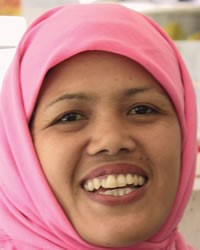Java Mancanegari in Indonesia

Photo Source:
Copyrighted © 2026
Anonymous All rights reserved. Used with permission |
Send Joshua Project a map of this people group.
|
| People Name: | Java Mancanegari |
| Country: | Indonesia |
| 10/40 Window: | Yes |
| Population: | 21,713,000 |
| World Population: | 21,713,000 |
| Primary Language: | Javanese |
| Primary Religion: | Islam |
| Christian Adherents: | 1.00 % |
| Evangelicals: | 0.22 % |
| Scripture: | Complete Bible |
| Ministry Resources: | Yes |
| Jesus Film: | Yes |
| Audio Recordings: | Yes |
| People Cluster: | Java |
| Affinity Bloc: | Malay Peoples |
| Progress Level: |
|
Introduction / History
The Java Mancanegari live primarily in the province of East Java. The name Mancanegari means "outside the nation". This name was given to them by past kingdoms in Surakarta and Yogyakarta and refers to the fact that they resided outside of those kingdoms. The Java Mancanegari people simply refer to themselves as Javanese from East Java.
The Java Mancanegari take pride in their history. The ancient Hindu kingdoms of Kediri (11th -12th c. AD) and Majapahit (14th-15th c. AD) had influence from Vietnam to New Guinea. Relics from these eras are spread throughout Southeast Asia but are especially prevalent in East Java. Even today, Kediri and Mojokerto are the centers of Java Mancanegari culture.
What Are Their Lives Like?
Java Mancanegari make their living primarily through agriculture. Their fertile land, composed of rich volcanic soil and crisscrossed by rivers and tributaries, provides as many as four crops per year. They raise rice as their primary crop and also cultivate tobacco, soybeans and corn.
Those who feel they don't have a future in the villages seek employment in the cities, where a growing industrial sector is developing. Some of the primary industries include textile, cigarette, steel and furniture production.
Though considered less "refined" than the other Java subgroups, the Java Mancanegari are known for their openness and straightforwardness, their "can do" attitude and their indomitable spirit. Many of Indonesia's independence leaders, including the first president, came from the Java Mancanegari.
Cultural events and ceremonies include the Reog and Kuda Lumping dances. During these dances, the dancer will go into a trance by inviting spirits to enter his body in order to perform extraordinary acts. In the Kuda Lumping dance, the dancer dances around on a woven bamboo horse while eating glass, flowers and grass. In the Reog Dance, the dancer wears a giant tiger-head mask decorated with peacock feathers that is 2 meters tall and weighs about 45 kg.
What Are Their Beliefs?
The majority of Java Mancanegari call themselves Muslim. However, most mix Islamic practices with Hindu and Pre-Hindu beliefs. Many Java Mancanegari learn to read the Koran and vocalize prayers and koranic recitations in Arabic. However, they seldom understand the meaning of what they are reading or vocalizing. They often use the Islamic prayers as mantras and written verses from the Koran as good luck charms or to ward off evil spirits. Most Java Mancanegari give offerings to the guardian spirit, which watches over the village to ensure its protection and well-being.
What Are Their Needs?
Java Mancanegari need more employment opportunities due to the high unemployment rate among them. As farmers, the Java Mancanegari need to adopt new farming techniques and to return to traditional organic farming, due to soil problems from the over-use of chemical fertilizers. Outside of the major cities, the people need modern medicine and educational opportunities.
Prayer Points
Ask the Holy Spirit to free the Java Mancanegari from the grip of malevolent spirits.
Pray for a hunger for the truth that will lead them to the cross and the empty grave.
Thank God for the availability of the entire Bible in Javanese.
Ask God to send workers to the Java Mancanegari to share the gospel and to help them with educational, employment and medical needs.
Pray for a Disciple Making Movement among the Java Mancanegari to result in multiplying disciples and house churches.